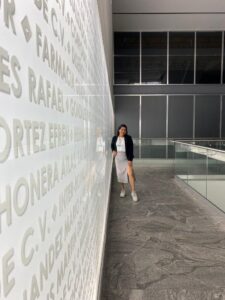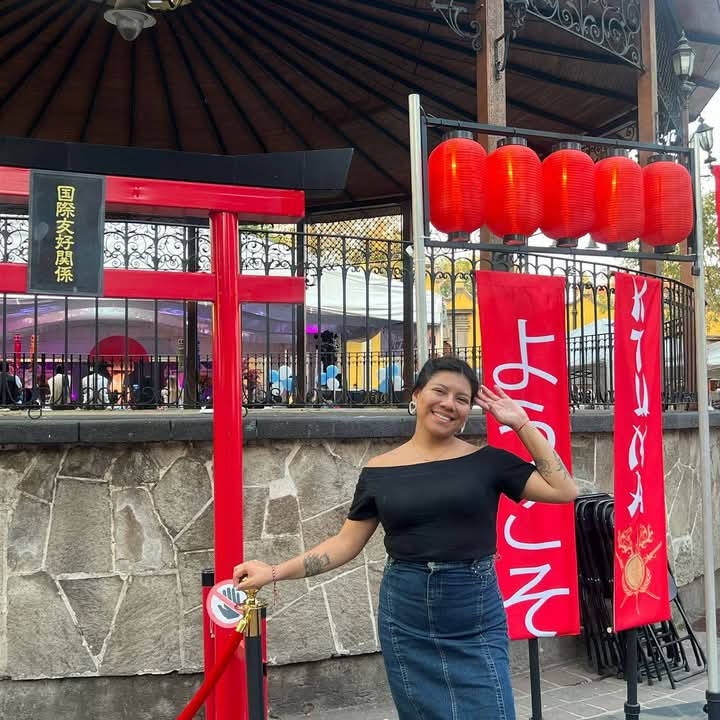By Hannia Yohali Zenteno Cruz
Youth Advisory Group (GAJ) / GOYN-Mexico
I'm 25 years old and have always lived in Ecatepec de Morelos, State of Mexico. For many, this municipality represents a red mark on the map: femicides, crime, poverty, institutional neglect. For me, it also represents a home, a starting point, a complex territory that has shaped me.
As a child, my universe was the street where I grew up. I remember going out on my bike and loving to make up stories and spend time with the neighbors. My parents worked in a key repair shop, and although we didn't have luxuries, we made an immense effort to support the family. To others, Ecatepec seemed all about violence; but I visualized solidarity, celebration, and cooperation. That dual childhood taught me that the territory marks you as much by its wounds as by its resistance.
Violence isn't something abstract: I've felt it in my body and in my walk. There are streets that are not traveled, schedules that are avoided, routes that are modified. The geography of fear also defines who we are. For youth on the outskirts, it's not enough to study or "give it your all"; structural barriers must be overcome every day.
Since then, distance has been one of the most persistent obstacles. To study, find work, or access cultural or sports activities, very few people even look at us.

From the moment I entered high school, I had to commute for more than an hour and a half. My admission to college was a personal and family achievement, but it also entailed enormous physical and emotional strain. I would wake up at 4:00 a.m., my dad would escort me to the subway for safety, and then the journey began: getting to Ciudad Universitaria on time, taking classes, crossing campus, dealing with unfriendly professors, and then returning with the bus jammed up.
At university, I finally met and empathized with people who came from similar backgrounds to mine. I questioned why we had to travel so long to earn a degree, yet we were still quite privileged. I met students from other states, from backgrounds farther from mine, and I formed some of my first support networks.
With the pandemic, everything became more acute. Without equipment or stable internet, I had to put my studies on hold. I looked for work and found myself facing scams (selling perfumes) and low-paying jobs. At home, there were six of us sharing two rooms. There was no space to concentrate or rest. However, amid the chaos, I found unexpected paths. I began to get involved in organizations that spoke to youth from a broader perspective, groups that offered me a glimmer of hope in the face of so much collapse. Some time later, I joined GOYN and the Youth Advisory Group (GAJ), where for the first time I felt that my experience was worth more than just statistics.
Joining the GAJ was a turning point. At first, I doubted whether I should stay: Would I have time? Do I have anything to contribute? Would my voice be heard? I found a space with other young people like me, from different municipalities in the State of Mexico. We began to build together from our experiences, to recognize each other through anger, exhaustion, and the desire to transform. There I learned that participation isn't just about talking, but about sharing knowledge, defending common causes, and having a political impact.
During this time, I've participated in assessments, proposals, discussions, panels, and processes I never imagined possible. At GAJ, we promote youth diversity.
Throughout this journey, I have also connected with other youth communities in Latin America through networks promoted by GOYN. There I confirmed that the problems are not individual or local, but rather structural and global.
There are recurring patterns: digital exclusion, youth unemployment, postal code discrimination, and lack of opportunities... but I also found a collective strength articulated through empathy, collaboration, and tenderness. In these encounters, I cried, I laughed, I questioned everything, and I reaffirmed myself as a young woman with the right to occupy every space.
Resisting in Ecatepec means confronting institutional abandonment, job insecurity, insecurity, and social stigma. Sometimes, we even confront ourselves when we feel we're not up to par or that we should settle for what we've been given. But building ourselves through mutual care, networks of trust, and tools we invent outside the system does help.
Resilience is not a romantic choice; it's a response to adversity. And while it shouldn't be idealized, it must be acknowledged. Surviving, supporting, sharing, healing, and fighting from the margins entails a profound wisdom that often goes unappreciated. We don't want to be applauded for enduring so much; we want conditions that don't force us to live in these conditions. We want real access to opportunities, decent transportation, guaranteed mental health, education that doesn't exclude, and jobs that don't discriminate.
Today, I look back on my journey with pride—not because it's been easy—but because I've walked it with others; because I've been fortunate to find spaces like GOYN, people like my colleagues at GAJ, experiences that have helped me name what previously only hurt. I continue to build with the conviction that transformation begins when those of us who have been silenced speak out.
From Ecatepec, from the edge of the map, I raise my voice for my territory to say that we exist, that we matter, and that we deserve more. We want dignified lives, safe places, and real opportunities for ourselves and for those who come after us.






